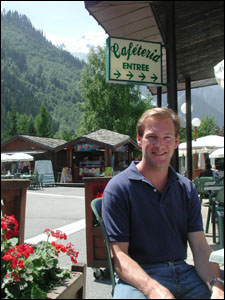Navigating the swells and dips of HBS
USS Cole veteran holds a steady course through Business School
Nathaniel Fogg, graduating from Harvard Business School this year, is something not often found on an Ivy League campus in this age of an all-voluntary military: a veteran of the United States Navy.

Moreover, he’s one who felt the call to service well before the Sept. 11 terrorist attacks. After graduating from Yale in 1997, with a major in art history, he went directly into Officer Candidate School in Pensacola, Fla.
His naval service made him realize sooner than most people that terrorism wasn’t something that Americans are immune to. He spent part of his time on the USS Cole, which he’d left just four days before it was attacked by al-Qaida in the port of Aden in October 2000, nearly a year before the attacks on New York and Washington. “I was on the last helicopter off the ship before it was hit.” Of the friends he lost in the attack he adds, “I went to 10 to 15 funerals in the space of two weeks.”
Fogg grew up in New York City, the son of an investment banker and a professional artist, in a family with a strong naval tradition as well: His grandmother was in the WAVES, a Navy program established in World War II (Women Accepted for Volunteer Emergency Service), and his grandfather was a lieutenant commander in the Navy. His mother’s mother’s father commanded the U.S. naval forces during the invasion of Normandy in June 1944.
He also credits his school, Groton, for instilling a service ethic. He remembers gathering with his fellow students in the chapel every morning, and seeing the names of Groton alums who had given their lives in military service etched into the walls. It made an impression, he says. “I imagine that was intentional,” he adds.
When Fogg talks about his work aboard the USS Cole, he uses phrases familiar in the worlds of politics or business: “damage control,” for instance, and “keeping the ship afloat.” But he means them quite literally. Fogg conducted training aboard the ship, instructing his sailors in putting out fires (another activity that has its metaphorical civilian counterpart), controlling flooding, rigging emergency power systems, and the like.
“The Navy is very good at this kind of training,” he says, and he thinks businesses would benefit from doing similar drilling and “war-gaming.”
In these days of very lean supply chains, “you open yourself up to some dangers if you focus on the competitive angle and not the resilience of a business,” he says, suggesting that businesses need both. He ticks off some of the major disasters, natural and otherwise, that businesses have had to face over the past few years: the 2004 hurricane season, the lockdown of West Coast ports, the Asian tsunami, the SARS epidemic. Companies need to be sure that they can reach key people in an emergency, and have alternative suppliers and alternative supply routes if their usual ones fail. “It pays enormous dividends to pay attention to this,” he notes.
This interest in sharing best practices has fueled his desire to work on the government side of consulting, he says.
After traveling in western China with his B-school roommates, Fogg plans to start in September with the consulting firm Booz Allen Hamilton, for which he worked as a summer associate last year. He’s had other Washington experience as well, working for Republican Sen. Jon Kyl of Arizona on homeland security issues.
During his years in the service, Fogg has seen security awareness ramp up after a terrorist attack, and then fall back. Since 9/11, however, “it’s sort of plateaued,” he says, “and I hope it doesn’t fall.” In his concern for security, he’s not advocating “restricting privacy,” he explains, saying, “I’m talking about awareness.”
However serious the attack on the Cole was – and Fogg suggests that one has to reach back to the Revolutionary War for a precedent – it could have taken a far worse toll. Did the damage-control training the crew received play a role in that?
Too tactful to let himself be quoted taking personal credit in any way, Fogg nonetheless says of the comrades who coped with the explosion, “They did an incredible job of keeping that ship afloat. It took a 40-by-40-foot hole at the water line.”
Fogg has occasionally had calls from people who want to talk with him about going into military service. “I’ve felt honored to talk to these guys,” he says. He stresses, “It’s not all fun and games, and it’s not just a ‘service’ checkbox on your résumé.” Military service is not like a civilian job you can just walk away from, either. “It’s four or five years of your life.”
Still, he says, “My hope is that post-9/11, the rumors that our generation has felt a call to service are true.”




